The Department of Microbiology, like our university as a whole, turned 100 years old in 2020.The Department of General Pathology and Bacteriology was founded in 1920 by a prominent domestic microbiologist, student of I.I.Mechnikova, a world-famous scientist (work on scarlet fever and phagocytosis), Honored Scientist of the RSFSR, Professor Ivan Grigorievich Savchenko.In 1928, it was divided into two departments – the department of bacteriology and the department of general pathology, later pathophysiology.The history of the Department of Microbiology began in 1920, when, with the help of the medical unit of the 9th Army of the Red Army and the health department of the Kuban Revolutionary Committee I.G.Savchenko organized the Kuban Chemical-Bacteriological Institute (KHBI) on the basis of the city sanitary-bacteriological laboratory, becoming its director on March 28.On August 14 of the same year, he was appointed professor in the department of pathology and bacteriology of the medical faculty of the newly opened Kuban University.It was he and the dean of the medical faculty (later the rector of the medical institute) prof.N.F.Melnikov-Razvedenkov was entrusted with giving the first lectures to students on September 4, 1920.
Microbiology
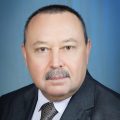
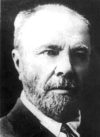
Honored Scientist of the RSFSR Professor Savchenko Ivan Grigorievich (1862-1932)
Thanks to the hard and very fruitful work of Professor I.G. Savchenko and his students, within a few years KHBI turned into a large scientific research center known far beyond the borders of the North Caucasus. The Institute produced a wide range of vaccines and serums, the use of which significantly improved the epidemiological situation in the region.
The research topics of the department and institute staff led by him were related to the pathogenesis of cholera, the etiology of tumors, immunity in recurrent typhus, the mechanism of phagocytosis, the pathogenesis, treatment and prevention of scarlet fever (an anti-scarlet fever vaccine and serum were developed), and the serological prevention of malaria.
With the participation of I.G. Savchenko, a malaria station was established in Krasnodar, which worked in close contact with the KHBI. The diagnosis of malaria has been improved, and the Savchenko-Baronov reaction has been proposed to determine the type of pathogen (complement binding reaction with extract from the liver of people who died from malaria as an antigen diagnostic).
The biochemistry of cholera and cholera-like vibrios, the epidemiology of cholera and typhoid fever were studied. In 1921, assistant professor E.V. Voronina discovered the causative agent of a typhus-like disease, bipolar sepsis (now Salmonella paratyphi C).
Professor I.G. Savchenko is the author of more than 100 publications. About 1,000 scientific papers were published from the institutions he led.
The students and followers of Professor I.G. Savchenko became heads of departments in various institutes of our country. These are S.A. Belyavtsev (Ufa), V.G. Peshkovsky (Lviv-Perm-Nizhny Novgorod), A.N. Gordienko (Krasnodar-Khabarovsk-Rostov), J.P. Roznatovsky (Krasnodar), G.N. Kovalsky (Krasnodar), S.G. Mironov (Orenburg).
In 1928, the departments of Microbiology and General Pathology were separated. I.G. Savchenko, remaining director of the KHBI, at the same time retained the Department of General Pathology at the Medical Institute. Professor Yakov Petrovich Roznatovsky (1890-1938) was elected Head of the Department of Microbiology. However, this separation was of a formal nature, since both departments remained in the premises of the KHBI, and Ivan Grigorievich was the scientific supervisor and the soul of both departments until the last days of his life. His collaborators and closest assistants at the Department of Microbiology were J.P. Roznatovsky, S.A. Belyantsev, E.V. Voronina, I.P. Patrick, I.I. Voinov, and others. The classrooms and the auditorium were located on the second floor of the main building of the KHBI (now 98 Rashpilevskaya St.).
I.G. Savchenko died in 1932 and was buried at the Vsesvyatskoye cemetery. Krasnodar.
In 1928-1937, the Department of Microbiology was headed by Yakov Petrovich Roznatovsky, and his assistants were I.I. Voinov, G.M. Alekseev and Kulinsky. Postgraduate students are P.I. Provotorov and A.A. Chasovnikov.
The scientific work of the Department of Microbiology during this period was, as before, closely related to the work of the KHBI, since some of the teachers of the department were also employees of the Institute, and the laboratories of the Institute were widely used as the material base of the department. In this regard, an important place in the scientific work of the department was occupied by the production of bacterial preparations, in particular scarlet fever toxoid, and the study of their effectiveness. In addition, the staff of the department carried out a number of studies on the epidemiology of various forms of malaria, papatachi fever and other infections relevant to our region.
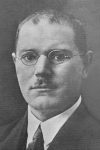
Professor Roznatovsky Yakov Petrovich (1890-1937)
In January 1938, Professor Ya.P.Roznatovsky, probably based on a false denunciation, was arrested for “participation in a counter-revolutionary nationalist group” and was shot in February.In 1957, a special board of the military tribunal of the North Caucasus Military District rehabilitated him posthumously “for lack of evidence of a crime.”From 1938 to 1941, the Department of Microbiology was headed by Associate Professor G.M.Alekseev.The main direction of the department’s scientific work during these years remained the same.A number of works have also been carried out on vaccine therapy for gonorrhea and pustular skin diseases.During the Great Patriotic War, the department, together with the entire institute, was evacuated first to Yerevan, and then to Tyumen.During the period of evacuation (1942-1944), the duties of the head of the department were performed by assistant K.N.Roshchupkina.In extremely difficult evacuation conditions, in unsuitable premises, in the absence of the necessary equipment, experimental animals and reagents, the staff of the Department of Microbiology were able to provide training to students at a fairly high level.The great merit of all the employees of the department during these years was that they were able to preserve all the most valuable equipment, primarily microscopes and teaching aids.This made it possible to immediately resume classes upon the department’s return to Krasnodar and provide students with the opportunity to work independently.From April 1944 to July 1945, the Department of Microbiology was headed by Professor M.V.Revo, under whose leadership the scientific activities of the department were resumed in contact with the Krasnodar Institute of Epidemiology and Microbiology (transformed from KHBI in 1937).At this time, assistants of the department were K.N.Roshchupkina, N.I.Maligonova, E.G.Korneeva, O.N.Brusnikina – a number of works were begun to study methods of therapeutic use of bacteriophages, the immunology of tuberculosis and other problems.However, this work was soon stopped due to the transfer of Professor M.V.Revo to work at another institute.The next stage in the development of the Department of Microbiology is associated with the name of Professor Boris Pavlovich Pervushin.With his many years of fruitful activity as head of the department and then vice-rector of the Kuban Medical Institute, he had a huge impact on the organization of educational, pedagogical and scientific work not only at the department of microbiology, but throughout the entire medical institute.Together with B.P.Pervushin in 1946-1950.Assistants O.V. worked at the department.Brusnikina, E.G.Korneeva, A.D.Shcherbakova and M.L.Khanin.In 1950, postgraduate studies were introduced at the Department of Microbiology.The first graduate student was A.I.Korotyaev.The teaching staff of the department began to be replenished by graduates of the institute who decided to devote themselves to microbiology.The employees of the department were B.I.Rukavtsov (later professor, head of the department of genetics and microbiology, dean of the biological faculty of Kuban State University), L.I.Neklyudov and A.I.Korotyaev.Later graduate students of the department were Kh.P.Gamleshko and V.F.Maksimov.
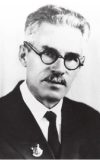
Professor Pervushin Boris Pavlovich (1895-1961)
With his scientific research, especially in the field of brucellosis, B.P.Pervushin made a major contribution to the development of domestic microbiology.His monograph “Issues of microbiological and immunological diagnosis of brucellosis in humans” remains relevant to the present day.Under the guidance of Professor B.P.Pervushin formed such prominent scientists as professors A.I.Korotyaev, I.B.Tsynkalovsky, B.I.Rukavtsov, Kh.P.Gamleshko and others. Successor B.P.Pervushin, Alexander Ivanovich Korotyaev, professor, Honored Scientist of the RSFSR, order bearer, who headed the department for over 30 years (1958-1990), became the head of the microbiology department.The period of his leadership constituted an entire era in the development of the Department of Microbiology, and brought it to the all-Union and even international level.In 1961-63.A.I.Korotyaev was on a business trip to the island.Cuba, where he organized microbiological and anti-epidemic services in the country’s health care system.Thus, the foundations and traditions of the microbiological service of Cuba were laid by him.His work in this direction was highly appreciated and received state awards from the leadership of Cuba and the Soviet Union.A.I.Korotyaev was a personal friend of Fidel Castro.The rapid development of biological sciences, and primarily microbiology, virology and immunology, required a lot of work to restructure teaching at the department.The educational process included lectures on the latest achievements in molecular biology, genetics, cytology and bacterial physiology.Practical classes in virology were organized, during which students infected chicken embryos and cell cultures to cultivate viruses.New methods of microscopy (luminescent, phase-contrast), new serological reactions (passive hemagglutination, immunofluorescence) were introduced.For 15 years, students were taught a course of lectures on molecular biology.With the name A.I.Korotyaev is associated with the next, molecular biological stage in the history of the Department of Microbiology.The most important event, both for the department and for the university, was the organization of a laboratory of molecular biology of bacteria at the department in 1968.The laboratory was equipped with the most modern equipment for that time, including an electron microscope, analytical and preparative ultracentrifuges, equipment for electrophoretic, spectrophotometric and chromatographic studies, and later a radioisotope laboratory was organized.
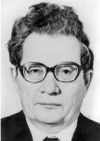
Honored Scientist of the RSFSR Professor Korotyaev Alexander Ivanovich (1924-2011)
Since the late 60s, the scientific interests of the department have traditionally been associated with the genetic and ribosomal apparatus of the bacterial cell. During this time, comprehensive studies were conducted and the circumstances of the ribosome content in bacteria were clarified (A.I. Korotyaev, V.G. Orlov, G.N. Naumov, N.N. Lischenko), the intracellular placement of ribosomes in bacteria (V.G. Orlov), and some theoretical ideas about the mechanism of ribosome functioning were formulated (A.I. Korotyaev, V.G. Orlov), the dynamics of the DNA content in bacteria was studied and the nature of the alkali-labile and alkali-stable fractions in the DNA molecule was clarified (A.I. Korotyaev, V.G. Orlov, T.P. Krolichenko).
The works of A.I. Korotyaev related to the study of the biology and epidemiology of antibiotic resistance plasmids – R-plasmids (A.I. Korotyaev, T.V. Malysheva, M.S. Manuvakhova, I.A. Sidorov, O.V. Dorokhina, S.A. Babichev) became famous. The high scientific and methodological level of plasmid research performed at the Department was appreciated, and since 1976 the Department of Microbiology has been included in the All-Union Scientific Program “Plasmid”, which was carried out under the auspices of the Academy of Sciences and the Academy of Medical Sciences of the USSR. The department participated in it during the entire duration of the program. In 1980 The annual All-Union workshop (conference) on the Plasmid program was held at the Department of Microbiology. The works of the Department of Microbiology on plasmid subjects were published in leading scientific journals of the USSR.
The results of scientific and educational work were published in the central press, reported at conferences and congresses, and summarized in collections of scientific papers and monographs: “Mechanisms of bacterial self-regulation” (1973), “Molecular Biology of bacteria” (1978), “Immunity and genetic homeostasis” (1987), etc. The textbook on microbiology for medical students has gone through 5 editions and was published in 1992 as a “Guide to classes in Microbiology, Virology and Immunology.” Under the guidance of A.I. Korotyaev completed and defended about 40 doctoral and PhD theses. Among his students are V.G. Orlov, A.A. Astapov, V.G. Borisenko, E.V. Karaseva, V.I. Koikov, T.V. Malysheva, N.N. Lischenko, G.N. Naumov, T.P. Krolichenko, G.G. Vyatkina, S.A. Babichev and others. As a result, the Department of Microbiology has become a forge of highly qualified microbiologists for the Krasnodar Territory and other regions of the USSR. A.I. Korotyaev’s students held high positions in the Kuban State University. University, Kuban State University. Agricultural University, VNIIRIS, VNIIfitopathology, SKNIIbiotechnology and Chemistry, All-Russian Research Institute of Applied Microbiology, All-Russian Research Institute of Food Biotechnology and other educational and scientific institutes.
Until 1990, the Krasnodar Branch of the All-Union Microbiological Society under the USSR Academy of Sciences operated on the basis of the Department of Microbiology, which brought together microbiologists from universities, research institutes and microbiological enterprises of the Krasnodar Territory, whose permanent chairman was A.I. Korotyaev.
The staff of the department received 15 copyright certificates for inventions and registered 9 innovation proposals. The international and domestic recognition of the scientific achievements of the department is evidenced by the organization on its basis of the V All-Union Meeting on Plasmids (1980) and the VI All-Russian Congress of Microbiologists, Epidemiologists and Parasitologists (1985), as well as scientific trips of employees abroad (England, Germany, USA).
In 1990-2005, the department was headed by Professor Vyacheslav Georgievich Orlov. He headed a new scientific direction of the department, which was named “The ribosomal apparatus of bacteria and its immunoprotective properties.” The students who defended their PhD theses under his guidance were V.P. Krylov, O.A. Kachanova, F.S. Siyukhova, and N.E. Skoblikov.
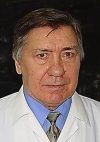
Professor Orlov Vyacheslav Georgievich (1938-2006)
Since 2005, the department has been headed by Candidate of Medical Sciences, Associate ProfessorSergey Anatolyevich Babichev. He is one of the authors of the textbook on microbiology, Medical Microbiology, Immunology and Virology, which has undergone several reprints. In collaboration with Professor A.I. Korotyaev, he wrote the monograph “The role of genetic and mental information systems in the origin and development of life on Earth” (2009).
The department carries out a comprehensive scientific topic “Pyogenic microflora in clinical microbiological research”. The work is carried out in close cooperation with the bacteriological laboratories of the regional, city and district hospitals of the Krasnodar Territory. A number of studies are conducted jointly with the clinical departments of the university, the results of the work are published in leading journals and reported at conferences. The staff of the department actively participates in the work of the Krasnodar branch of the Regional Microbiological Society.
Students of all faculties study at the department, about 1,000 students annually. The educational process is conducted in specially equipped classrooms, where students master the techniques of bacteriological techniques and gain basic knowledge of medical microbiology, which is so necessary for a doctor of any specialty and a pharmacist. Students are forming an idea of microbiology as one of the most important fundamental disciplines in the medical education system. It is designed to ensure that students receive basic general biological and medical knowledge necessary for the subsequent formation of a medical specialist’s correct understanding of infectious pathology, causes, mechanisms and clinic of infectious diseases, as well as scientific knowledge for the organization of adequate etiological treatment and specific prevention of infectious diseases and nosocomial infections.
The Department of Microbiology makes extensive use of digital and media technologies to enhance the information content, clarity and effectiveness of students’ learning. When teaching students of medical, pediatric, dental and preventive medicine faculties the disciplines of “Microbiology, virology, immunology”, “Microbiology, virology. Oral Microbiology” and “Sanitary Microbiology” at the Department of Microbiology, modern scientific information on these disciplines is used, and media presentations are widely used. The staff of the department developed media presentations in accordance with the work programs and the Federal State Educational Standard, and are used in lectures and practical classes with students in the following sections: General Microbiology (10 lectures, 17 practical classes), Private Microbiology (10 lectures, 17 practical classes), Clinical Oral Microbiology (4 lectures, 6 practical classes), Sanitary microbiology (7 lectures, 17 practical exercises). These presentations explain the main points of the lesson, highlight the main points, and provide demonstration material (diagrams, drawings, photographs). The average presentation volume is 50-70 slides, which allows you to present the educational material in sufficient volume.
A student scientific circle is actively working at the Department of Microbiology. Meetings are held regularly, and students participate in university and interuniversity conferences, where they win prizes.
Currently, associate professors T.V. Malysheva, G.N. Naumov, O.A. Kachanova, F.S. Siyukhova, and assistant A.V. Sergeeva work at the department.

